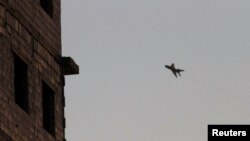A Syrian rights group says a government air raid has struck a high school in a rebel-held northern town, killing at least 12 people, most of them students.
The Syrian Observatory for Human Rights said the death toll from Sunday's air strike on the school in Raqqa is likely to rise because some people were critically wounded.
Syrian government warplanes have repeatedly attacked Raqqa since rebels took control of the provincial capital in March.
The Observatory also said rebels killed at least 19 government fighters in an overnight assault on the Qalamoun area on the outskirts of Damascus.
Elsewhere Sunday in Syria, United Nations chemical weapons experts left their hotel to investigate seven sites across the country for evidence of alleged chemical attacks.
The U.N. group is separate from a team of inspectors of the Organization for the Prohibition of Chemical Weapons, who are due to start work in the coming days to destroy Syria's chemical arsenal.
The OPCW mission follows the U.N. Security Council's approval of a resolution calling on Syria to eliminate its chemical weapons.
Syrian President Bashar al-Assad said Sunday he will respect that demand, but not because of the resolution.
In an interview with Italian TV channel RAI News, he said Syria already had joined an international convention banning chemical weapons in the weeks before the resolution was adopted. He said it is part of Syrian "history" to comply with the treaties it signs.
Assad repeated his refusal to negotiate with armed members of the opposition, whom he calls "terrorists."
He also said "most" European nations cannot play a role in resolving the Syrian conflict because they have adopted U.S. positions.
The United States and its allies have called on the Syrian president to quit for leading a violent crackdown on a two-year rebellion that began with peaceful protests against his decade-long authoritarian rule.
The Syrian Observatory for Human Rights said the death toll from Sunday's air strike on the school in Raqqa is likely to rise because some people were critically wounded.
Syrian government warplanes have repeatedly attacked Raqqa since rebels took control of the provincial capital in March.
The Observatory also said rebels killed at least 19 government fighters in an overnight assault on the Qalamoun area on the outskirts of Damascus.
Elsewhere Sunday in Syria, United Nations chemical weapons experts left their hotel to investigate seven sites across the country for evidence of alleged chemical attacks.
The U.N. group is separate from a team of inspectors of the Organization for the Prohibition of Chemical Weapons, who are due to start work in the coming days to destroy Syria's chemical arsenal.
The OPCW mission follows the U.N. Security Council's approval of a resolution calling on Syria to eliminate its chemical weapons.
Syrian President Bashar al-Assad said Sunday he will respect that demand, but not because of the resolution.
In an interview with Italian TV channel RAI News, he said Syria already had joined an international convention banning chemical weapons in the weeks before the resolution was adopted. He said it is part of Syrian "history" to comply with the treaties it signs.
Assad repeated his refusal to negotiate with armed members of the opposition, whom he calls "terrorists."
He also said "most" European nations cannot play a role in resolving the Syrian conflict because they have adopted U.S. positions.
The United States and its allies have called on the Syrian president to quit for leading a violent crackdown on a two-year rebellion that began with peaceful protests against his decade-long authoritarian rule.





